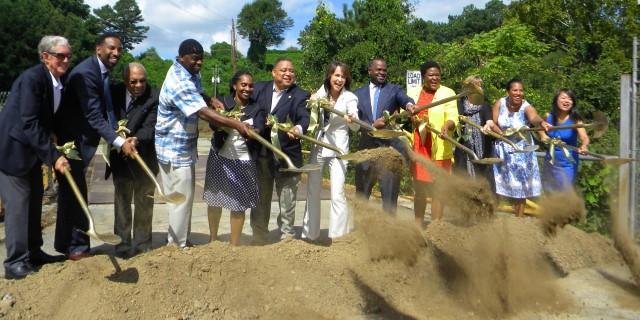Atlanta Starts Work On Proctor Creek Trail

A ceremony was held Thursday for the official groundbreaking on the Proctor Creek Greenway. The paved trail will eventually travel 7 miles along Proctor Creek, from neighborhoods near downtown to the Chattahoochee River.
AL SUCH / WABE
A symbolic milestone this week on a major infrastructure and environmental project in Atlanta: The official groundbreaking on the Proctor Creek Greenway.
The paved trail will eventually travel 7 miles along Proctor Creek, from neighborhoods near downtown to the Chattahoochee River. It’s the first project funded by the transportation sales tax that Atlanta voters approved last November.
At the groundbreaking ceremony Thursday, Atlanta Mayor Kasim Reed said the trail will connect neighborhoods to each other, and to the creek.
“There was a time when folks used this creek for pleasure, enjoyment and relaxation, and I’m here to tell you, these days are coming back again,” he said. “We’re going to be in that creek.”
Proctor Creek starts in downtown Atlanta, and for decades it’s been a source of blight. It’s had problems with sewage, pollution, dumping, flooding.
The creek’s condition has improved in recent years, thanks to work from advocacy groups, and local and federal agencies. Changes to the city’s sewer system have addressed some of the creeks issues, and plans for new parks that absorb storm water will help, too.
So it’s not as polluted as it once was.
“Not all of the creek is healthy in a broad sense, but it’s doing well,” said Darryl Haddock, environmental education director at the West Atlanta Watershed Alliance. “I think if we can start to do small restoration projects — and hopefully [the Greenway] will kick off a few — that we will get larger benefits over time.”
The Greenway will likely usher in economic development, too.
The city is beginning construction near the Bankhead MARTA station. The 2-mile section of trail will pass through Westside Reservoir Park, the planned greenspace that will eventually be the largest in the city. And eventually, this trail will connect with the BeltLine.
“Proctor Creek will serve as a catalyst for growth for attracting new features that this neighborhood has needed and deserves,” Reed said.
The Emerald Corridor Foundation owns some of the land the trail is being built on, and it plans to develop areas between the MARTA station and the future giant park.
“We’d like to see housing — a mixed income community with affordable housing. We’d like to promote jobs,” said Emerald Corridor Foundation President Joel Bowman.
“This is a new node of activity,” said Emerald Corridor Foundation Executive Director Debra Edelson. “It’s not just the station, just a mixed-use development. It’s the trail, it’s the park. So many things are coming together in a compressed time frame that are just going to put this on the map.”
The prospect of all that change, not just along the Greenway, but also along the BeltLine, and in other neighborhoods, also has people talking about gentrification.
Na’Taki Osborne Jelks, co-chair of the Proctor Creek Stewardship Council, said she wants the city to keep listening to residents as it develops plans for Proctor Creek and the parks and trails along it.
“We’re starting to see the displacement already happening around the Westside Trail,” Jelks said, referring to a new stretch of the BeltLine.
This situation can be hard for a conservation organization, Haddock said. He said he’s happy to see the city’s investment, but he hopes community needs line up with where the government puts its resources.
“We just want to make sure that there are just outcomes with projects like this, that the people who live around and through the environmental stressors get to benefit from the triple-bottom line benefits that come with projects like this,” he said.








